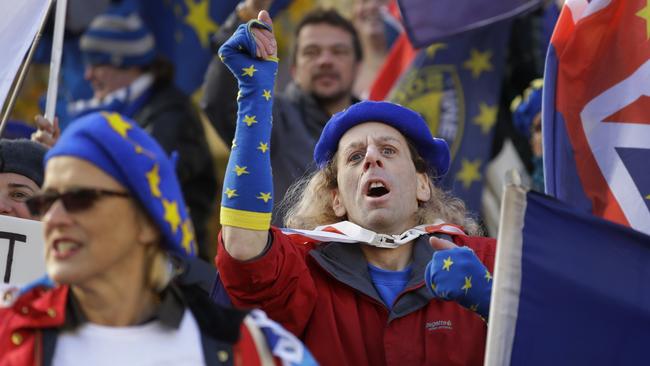Brexit puts the Poms on a downer
Anti-depressant use in England rose in the wake of Britain’s decision in 2016 to exit the EU.

Anti-depressant use in England rose compared with other prescription drugs in the wake of Britain’s decision in 2016 to exit the EU, according to research released yesterday.
Debate over the merits of Brexit has dominated Britain’s political discourse for more than two years, split families and communities and prompted panicked contingency plans from businesses in the event of a “no deal” with Brussels.
Little attention has been paid to the impact Brexit — and the uncertainty that’s dogged the process — has had on the population’s mental health.
Researchers at King’s College London looked at monthly prescribing data for anti-depressants for all 326 voting districts in England, comparing it with other classes of drugs in the run up to the June 23, 2016, referendum and the weeks following.
Given that the Brexit result came as a surprise that ushered in considerable uncertainty over its effect on Britain’s economy and society, the authors wanted to see whether that translated to greater anti-depressant use.
After calculating a defined daily dose to ensure they could compare different types of drugs fairly, they found that after the vote the volume of antidepressants prescribed increased 13.4 per cent relative to the other medicines studied.
“This shows that relative antidepressant prescribing increased in England after the Brexit referendum, compared with other drug classes that were used as a control group,” said Sotiris Vandoros, senior lecturer in health economics at King’s College London.
Although it was difficult to definitively tie the vote result to the rise in anti-depressant use, Dr Vandoros said the fact that the increase was relative to other forms of prescription drug was significant.
“A growing body of literature suggests that economic uncertainty can have negative effects on mental health,” he said.
“Job insecurity and worries about one’s future finances are associated with poorer health outcomes. Any event that triggers uncertainty and worries can have a negative effect.”
Given antidepressants aren’t prescribed to everyone, the study’s authors said the results couldn’t be taken to mean that the national mood as a whole worsened after the Brexit vote. Indeed, ardent supporters of Britain’s voluntary rupture with its single largest trading partner may have noticed their mood improve after the referendum.
Dr Vandoros said all else being equal, the surprise vote result and the tumult that followed was the likely explanation behind the relative rise in anti-depressant use.
“When the UK leaves the EU, we will start to see reality unfolding with regards to the anticipated events,” he said. “So uncertainty will be replaced with certain outcomes, whether positive or negative.”
The paper, published in the Journal of Epidemiology & Community Health, said governments should do more to offer mental health advice and support during times of political and economic uncertainty.
Allan Young, professor at King’s Institute of Psychiatry, Psychology & Neuroscience said its findings should be treated with great caution.
“Anti-depressant prescriptions have risen in England consistently over recent years and these data may simply reflect that rather than one single event,” he said. “Nevertheless, the call to support mental health issues should be heeded.”
AFP


